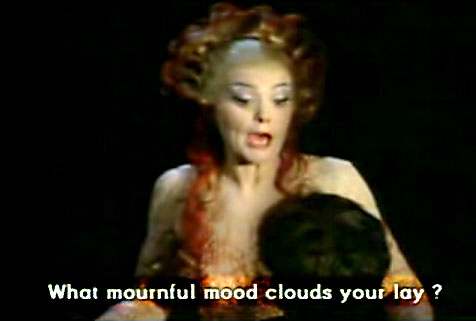
15 January 2008
14 January 2008
Perhaps the public would prefer to judge for themselves
"John Treleaven and Linda Watson Bring Passion to Wagner's Five-Hour Love Story" -- Los Angeles Downtown News
05 January 2008
Ein Kind ward hier geboren
Today, January 5, is the 91st anniversary of the birth of one of La Cieca's particular heroes, Wieland Wagner, stage director and designer. Here is a scene from Wieland's legendary production of Tristan und Isolde featuring Birgit Nilsson and Wolfgang Windgassen.
In this clip, Wieland is seen in rehearsal for his 1965 production of Der Ring des Nibelungen with Windgassen, Erwin Wohlfahrt, Theo Adam and Gustav Neidlinger.
(The first few seconds of the film clip are of Wieland's muse Anja Silja in her Bayreuth debut role of Senta.)
A page dedicated to the work of Wieland Wagner can be found at the Wagner Operas site.
In this clip, Wieland is seen in rehearsal for his 1965 production of Der Ring des Nibelungen with Windgassen, Erwin Wohlfahrt, Theo Adam and Gustav Neidlinger.
(The first few seconds of the film clip are of Wieland's muse Anja Silja in her Bayreuth debut role of Senta.)
A page dedicated to the work of Wieland Wagner can be found at the Wagner Operas site.
30 December 2007
27 December 2007
Circular reasoning

The infelicitous title of this musiciological study has led to a veritable festival of punning reviews over at amazon.com.
Labels: bathroom humor, gay gay gay gay gay, wagner
08 December 2007
Barenboim sings again!
Introducting a new guest critic, Giulia Grisi, who blogs regularly for "Il Corriere della Grisi."
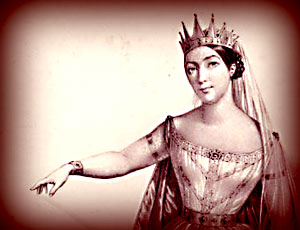 La Scala's 2007-8 opera season opened last night (December 7) with a new production of Tristan und Isolde. The Milanese theatre hadn't presented Wagner's masterpiece since 1978, when Carlos Kleiber's masterful interpretation became an instant classic, in spite of a not-so-sensational cast (Wenkoff, Ligendza, Baldani, Moll).
La Scala's 2007-8 opera season opened last night (December 7) with a new production of Tristan und Isolde. The Milanese theatre hadn't presented Wagner's masterpiece since 1978, when Carlos Kleiber's masterful interpretation became an instant classic, in spite of a not-so-sensational cast (Wenkoff, Ligendza, Baldani, Moll).
Superintendent Stéphane Lissner must have thought it was time to try it again, counting on the power of the music and the experienced production team, with conductor Daniel Barenboim, director Patrice Chéreau and set designer Richard Peduzzi (of the 1976 Bayreuth Ring). After all, everyone knows that singers aren't really that important in Wagner, nowadays... are they?
The rehearsals period was something less than idyllic because of problems with the unions, yet Barenboim's conducting can be called ideal: a beautiful, clean orchestra, rich in color and atmosphere -- in fact much more "singing" than the singers on stage. we can indeed describe Daniel B. as the true "deus ex machina" and the real protagonist of the night. Conducting from memory, he has led the La Scala orchestra towards a real Wagnerian sound and has made everything he could to help the singers, literally breathing with them, reducing the orchestral volume when they needed it, pumping it up when they could not finish a phrase. Through his conducting have felt the epic, the passion destroying every rule, the magnificent night, the eternal suffering -- in short, the Wagnerian drama we couldn't see on stage, where a great, realistic canal boat, stark grey walls, some staircases and a lot of trench coats were visible. Chéreau and Peduzzi presented their familiar Wagnerian mise en scène, utterly realistic and utterly ugly, with some dramaturgical errors.
This "avant-garde" art is so past and over that only an theater so behind the times as La Scala can appreciate it. Twenty-three years have passed since this team's modern dress Lucio Silla production here -- and even that was not a success.
Waltraud Meier is a brilliant actress, ravishing and sexy. However, her voice is faded in the lower octave (that's quite strange, since she began as a mezzo) and in the upper range she shrieks more than she sings. Often out-of-tune, she was able to sing the role to the end thanks to her experience and to Barenboim, who aided her in every possible way, underlining some beautiful intentions in her interpretation and drawing a veil over some glaring flaws in her singing (especially in the Liebestod).
Ian Storey is more a crooner than a Wagnerian tenor: a small, short voice, with insufficient projection, he was neither a hero nor a lover nor a dying prince. Tristan's love and drama were confined to the orchestral pit. Brangäne, the Wagner "specialist" Michelle De Young, offered the worst vocal performance of the night, with the possible exception of Matti Salminen's superannuated and shouty König Marke. Handsome Gerd Grochowski barked a rather conventional Kurwenal.
To make a long story short, La Scala has presented a Tristan und Isolde for orchestra and conductor. We may be too "addicted to voices", but without Barenboim and his experience in minimizing the singers' problems, this opening night would have been nothing special. -- Giulia Grisi, translated by Antonio Tamburini.
 La Scala's 2007-8 opera season opened last night (December 7) with a new production of Tristan und Isolde. The Milanese theatre hadn't presented Wagner's masterpiece since 1978, when Carlos Kleiber's masterful interpretation became an instant classic, in spite of a not-so-sensational cast (Wenkoff, Ligendza, Baldani, Moll).
La Scala's 2007-8 opera season opened last night (December 7) with a new production of Tristan und Isolde. The Milanese theatre hadn't presented Wagner's masterpiece since 1978, when Carlos Kleiber's masterful interpretation became an instant classic, in spite of a not-so-sensational cast (Wenkoff, Ligendza, Baldani, Moll).Superintendent Stéphane Lissner must have thought it was time to try it again, counting on the power of the music and the experienced production team, with conductor Daniel Barenboim, director Patrice Chéreau and set designer Richard Peduzzi (of the 1976 Bayreuth Ring). After all, everyone knows that singers aren't really that important in Wagner, nowadays... are they?
The rehearsals period was something less than idyllic because of problems with the unions, yet Barenboim's conducting can be called ideal: a beautiful, clean orchestra, rich in color and atmosphere -- in fact much more "singing" than the singers on stage. we can indeed describe Daniel B. as the true "deus ex machina" and the real protagonist of the night. Conducting from memory, he has led the La Scala orchestra towards a real Wagnerian sound and has made everything he could to help the singers, literally breathing with them, reducing the orchestral volume when they needed it, pumping it up when they could not finish a phrase. Through his conducting have felt the epic, the passion destroying every rule, the magnificent night, the eternal suffering -- in short, the Wagnerian drama we couldn't see on stage, where a great, realistic canal boat, stark grey walls, some staircases and a lot of trench coats were visible. Chéreau and Peduzzi presented their familiar Wagnerian mise en scène, utterly realistic and utterly ugly, with some dramaturgical errors.
This "avant-garde" art is so past and over that only an theater so behind the times as La Scala can appreciate it. Twenty-three years have passed since this team's modern dress Lucio Silla production here -- and even that was not a success.
Waltraud Meier is a brilliant actress, ravishing and sexy. However, her voice is faded in the lower octave (that's quite strange, since she began as a mezzo) and in the upper range she shrieks more than she sings. Often out-of-tune, she was able to sing the role to the end thanks to her experience and to Barenboim, who aided her in every possible way, underlining some beautiful intentions in her interpretation and drawing a veil over some glaring flaws in her singing (especially in the Liebestod).
Ian Storey is more a crooner than a Wagnerian tenor: a small, short voice, with insufficient projection, he was neither a hero nor a lover nor a dying prince. Tristan's love and drama were confined to the orchestral pit. Brangäne, the Wagner "specialist" Michelle De Young, offered the worst vocal performance of the night, with the possible exception of Matti Salminen's superannuated and shouty König Marke. Handsome Gerd Grochowski barked a rather conventional Kurwenal.
To make a long story short, La Scala has presented a Tristan und Isolde for orchestra and conductor. We may be too "addicted to voices", but without Barenboim and his experience in minimizing the singers' problems, this opening night would have been nothing special. -- Giulia Grisi, translated by Antonio Tamburini.
Labels: guest critic, la scala, regie, wagner
01 December 2007
15 October 2007
When I started stripping they hollered "put it on!"
One of La Cieca's pet peeves (and you know she has so many she has to keep them organized with a spreadsheet), well, anyway, one of La Cieca's pet peeves is that operatic orgies so rarely bear even the vaguest resemblance to orgies in real life. Why, just last week, La Cieca was viewing the Met's DVD of Tannhäuser, and, my dears, what a snooze! If ever a show needed a jolt of HPG, this is it.
of Tannhäuser, and, my dears, what a snooze! If ever a show needed a jolt of HPG, this is it.
Well, anyway, it does seem that finally La Cieca got her wish. Opera Australia just presented a new production of Tannhäuser by Elke Neidhardt. If photographs are to be trusted, Ms. Neidhardt has attended some of the same orgies La Cieca once graced:
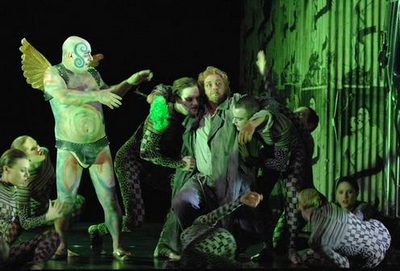
Well, anyway, it does seem that finally La Cieca got her wish. Opera Australia just presented a new production of Tannhäuser by Elke Neidhardt. If photographs are to be trusted, Ms. Neidhardt has attended some of the same orgies La Cieca once graced:
Labels: camp, festoonery, gay gay gay gay gay, wagner
30 August 2007
Hedge fund
Congratulations to NYT writer Michael Kimmelman, whose post-mortem on Katharina Wagner's Bayreuth Meistersinger contains a sentence that beats all world's records for running, standing and equivocation:
(More on Kimmelman's column over at Sounds & Fury.)
The approach is not, in the abstract, without merit, Beckmesser having always seemed a proto-Jew to Wagner, awaiting modern redemption; the opera’s end comes across as the screed it always seemed.La Cieca leaves it to her cher public to debate whatever ideas might be teased from this morass of weak passive voice; she'll get the ball rolling by asking, "What exactly is a 'proto-Jew' and what qualities of the character of Beckmesser would tend to make him "seem" proto-Jewish?"
(More on Kimmelman's column over at Sounds & Fury.)
Labels: cher public, nyt, wagner
09 August 2007
Kunst overload
Nelly Miricioiu sings the second act of Roberto Devereux plus the finale of Rossini's Ermione in the current episode of Unnatural Acts of Opera. Representing the German wing, Martha Moedl is seen in a rare television appearance, performing Lieder by Wagner and Wolf, discussing her career, and performing a scene from Mahagonny. It's all at Unnatural Acts of Opera.
28 July 2007
Judgment at Nuremberg
Well, this is what La Cieca gathers from Katharina Wagner's production of Die Meistersinger (without, of course, having had the benefit of actually seeing it!)
KW's basic idea is that Great-grandfather Richard presented an overly optimistic view of the dramatic action of the opera. Walther is taught by Hans Sachs to moderate his radical musical ideas by adopting traditional forms; that way his music can be understood by his audience. KW sees this compromise as a sellout, so she depicts the climactic singing contest satirically, as an "American Idol" hypefest.
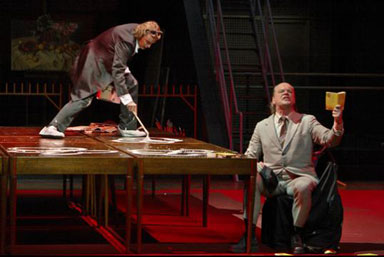
Walther basically grows out of his rebellious phase (e.g., splashing white paint all over the church in Act 1) and becomes just another bourgeois mastersinger. Sachs is played as an aging hippie type who also cleans up his act for the sake of popularity and respectability.
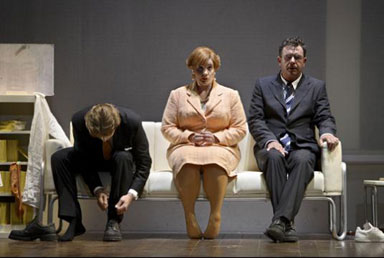
Meanwhile, Beckmesser the pedantic marker is transformed radically by the experience of the Act 2 riot. Depending on your point of view, he is either driven mad or else he has a profound spiritual awakening. The text of Walther's song that he filches for the competion is on a ripped-up sheet of paper, so his performance at the contest is nonsensical and the crowds laughs at him. And yet to him the song is the purest, most genuine music he has ever created -- but nobody else will ever be able to appreciate it. In a way he has become the radical artist that Walther aspired to be.
[La Cieca's earlier remark about Beckmesser appearing nude in Act 3 was mistaken; she apologizes.]
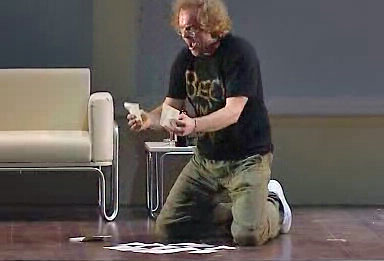
Now, it is safe to say that this is probably not the meaning Wagner had in mind when he wrote Meistersinger, and it is even a reasonable bet that this meaning is at best extremely difficult to convey through this particular text and music. Now, La Cieca doesn't know much about these things, but as she understand its, part of the current Regie philosophy is that a canonical work like Meistersinger is so utterly familiar to the audience that there is no point in performing it "straight," that you have to try to find something new to say through the work. Whether you believe in this philosophy or not (your doyenne is on the fence), you can perhaps agree that it is meant to be a serious way of approaching the work, not a frivolous one.
KW's basic idea is that Great-grandfather Richard presented an overly optimistic view of the dramatic action of the opera. Walther is taught by Hans Sachs to moderate his radical musical ideas by adopting traditional forms; that way his music can be understood by his audience. KW sees this compromise as a sellout, so she depicts the climactic singing contest satirically, as an "American Idol" hypefest.

Walther basically grows out of his rebellious phase (e.g., splashing white paint all over the church in Act 1) and becomes just another bourgeois mastersinger. Sachs is played as an aging hippie type who also cleans up his act for the sake of popularity and respectability.

Meanwhile, Beckmesser the pedantic marker is transformed radically by the experience of the Act 2 riot. Depending on your point of view, he is either driven mad or else he has a profound spiritual awakening. The text of Walther's song that he filches for the competion is on a ripped-up sheet of paper, so his performance at the contest is nonsensical and the crowds laughs at him. And yet to him the song is the purest, most genuine music he has ever created -- but nobody else will ever be able to appreciate it. In a way he has become the radical artist that Walther aspired to be.
[La Cieca's earlier remark about Beckmesser appearing nude in Act 3 was mistaken; she apologizes.]

Now, it is safe to say that this is probably not the meaning Wagner had in mind when he wrote Meistersinger, and it is even a reasonable bet that this meaning is at best extremely difficult to convey through this particular text and music. Now, La Cieca doesn't know much about these things, but as she understand its, part of the current Regie philosophy is that a canonical work like Meistersinger is so utterly familiar to the audience that there is no point in performing it "straight," that you have to try to find something new to say through the work. Whether you believe in this philosophy or not (your doyenne is on the fence), you can perhaps agree that it is meant to be a serious way of approaching the work, not a frivolous one.
Another point is that historically the first year's iteration of a Bayreuth production is expected to be an imperfect first draft; the artistic team are expected to do major revisions for the second year's run, based on what they are suppposed to freely regard as the mistakes of the first year. So really we'll have to wait until 2008 for the finished version of the youngest Wagner's vision. (Does anyone know if there are plans to telecast this production? The bits seen so far on video look as if it would adapt well to TV presentation.)
Labels: 2008, wagner, world leaders dancing in underwear
26 July 2007
Das Traumboot
Bayreuth scion-apparent Katharina Wagner's production of Die Meistersinger opened yesterday at the Festspielhaus.
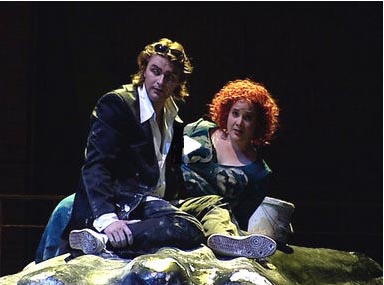
As you can see, this production is rather curiously cast with David Beckham as Walther and Aprile Millo as Eva.
Oh, well, all right, La Cieca must have her little joke, you know. The tenor is in fact Klaus Florian Vogt, whom many of you heard sing Lohengrin at the Met back in 2006, and, if this photo is anything like accurate, is indeed the "Traumboot" above referenced.
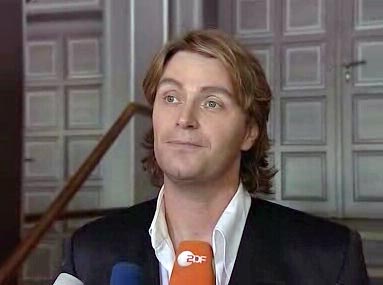
Now, be honest, cher public. If you saw this fellow approaching on a boat, would you even notice that it was drawn by a swan? No, La Cieca didn't think so.
Oh, and of course, that's not La Millo up there with the paint-spattered decolletage. More's the pity, La Cieca must say, because surely if it were Millo singing the soprano part in the quintet, it would be more nearly in tune than this snippet from the Generalprobe.
For those of you interested in Ms. Wagner's Konzept, here's a feature from German TV.

As you can see, this production is rather curiously cast with David Beckham as Walther and Aprile Millo as Eva.
Oh, well, all right, La Cieca must have her little joke, you know. The tenor is in fact Klaus Florian Vogt, whom many of you heard sing Lohengrin at the Met back in 2006, and, if this photo is anything like accurate, is indeed the "Traumboot" above referenced.

Now, be honest, cher public. If you saw this fellow approaching on a boat, would you even notice that it was drawn by a swan? No, La Cieca didn't think so.
Oh, and of course, that's not La Millo up there with the paint-spattered decolletage. More's the pity, La Cieca must say, because surely if it were Millo singing the soprano part in the quintet, it would be more nearly in tune than this snippet from the Generalprobe.
For those of you interested in Ms. Wagner's Konzept, here's a feature from German TV.
Labels: 2007, cher public, hunkentenor, millo, mp3, scandale, this diva looks like that diva, wagner
21 July 2007
Good Saturday
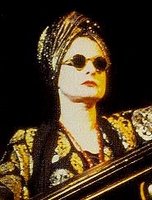 As if the third act of Parsifal were not enough for a single podcast, La Cieca and her sidekick Milton Host are surprised in the studio by a visit from The First Lady of the American Musical Theatre. Eventually TFLOTAMT has to leave the studio to prepare for her evening performance, and Milton and I can finally get on with the Wagner. It's a 1964 performance from Bayreuth featuring Jon Vickers, Thomas Stewart and Hans Hotter, with Hans Knappertsbusch conducting. Unnatural Acts of Opera.
As if the third act of Parsifal were not enough for a single podcast, La Cieca and her sidekick Milton Host are surprised in the studio by a visit from The First Lady of the American Musical Theatre. Eventually TFLOTAMT has to leave the studio to prepare for her evening performance, and Milton and I can finally get on with the Wagner. It's a 1964 performance from Bayreuth featuring Jon Vickers, Thomas Stewart and Hans Hotter, with Hans Knappertsbusch conducting. Unnatural Acts of Opera.UPDATE: La Cieca was informed earlier this evening that iTunes was not showing the most recent podcasts, including the previous two acts of Parsifal. She thinks she has the glitch corrected now, so if you use iTunes (or another podcatcher) to listen to Unnatural Acts of Opera, please do check in for these updates.
Labels: podcast, the first lady of the american musical theatre, wagner
12 July 2007
Zum Raum wird hier die Zeitgeist
As a warmup for this evening's Unnatural Acts of Opera podcast of Parsifal (Act 1), a short film by Kopernikus1618 demonstrating what happens when "Andy Warhol meets Richard Wagner."
Speaking of Unnatural Acts, La Cieca is once more setting a precedent by offering an alternative to the current program of Wagner's Rienzi, a live performance from Vienna in 1997. Since the Vienna Rienzi is heavily cut and catches Siegfried Jerusalem on an off night vocally, La Cieca has decided to make available the most nearly complete version of Rienzi available, based on a 1976 radio performance of the work conducted by Edward Downes. These mp3s were encoded by the ineffable Mike Richter for one of his invaluable Audio Encyclopedia CD-ROMs. You can download a .zip file containing the five acts of Rienzi here.
If you like what you hear (and why should you not?), you should note that this complete recording is now available in excellent sound on a 4 CD set released by Ponto, and the whole thing will set you back less than a Jackson.
Oh, and did La Cieca mention the video currently on the Unnatural Acts page, a short film in which five divas offer their "regrets" for their non-attendance at the Met's 1983 Centennial Gala? You will be overjoyed (we hope) to hear that this clip includes the celebrated Renata Scotto X-ray Story!
Speaking of Unnatural Acts, La Cieca is once more setting a precedent by offering an alternative to the current program of Wagner's Rienzi, a live performance from Vienna in 1997. Since the Vienna Rienzi is heavily cut and catches Siegfried Jerusalem on an off night vocally, La Cieca has decided to make available the most nearly complete version of Rienzi available, based on a 1976 radio performance of the work conducted by Edward Downes. These mp3s were encoded by the ineffable Mike Richter for one of his invaluable Audio Encyclopedia CD-ROMs. You can download a .zip file containing the five acts of Rienzi here.
If you like what you hear (and why should you not?), you should note that this complete recording is now available in excellent sound on a 4 CD set released by Ponto, and the whole thing will set you back less than a Jackson.
Oh, and did La Cieca mention the video currently on the Unnatural Acts page, a short film in which five divas offer their "regrets" for their non-attendance at the Met's 1983 Centennial Gala? You will be overjoyed (we hope) to hear that this clip includes the celebrated Renata Scotto X-ray Story!
10 July 2007
Rhine Gold
The Chuck Jones classic What's Opera, Doc? premiered exactly 50 years ago this week. And did you know that the "Bugs Bunny meet Wagner" motif was first essayed two years earlier, in the wartime short Herr Meets Hare?
29 June 2007
Roman holiday
Unnatural Acts of Opera returns with yet another rarity, Wagner's Rienzi in a performance from Vienna in 1997. Featured are Siegfried Jerusalem and Violeta Urmana, with Zubin Mehta wielding the baton. Unnatural Acts of Opera.
30 April 2007
Tristan und JJ
Our very own editor takes to the airwaves this afternoon when he is interviewed by John Schaefer on WNYC's Soundcheck. As part of "Tristan Mysteries" week here in New York, JJ will play selections from a few of his favorite recordings of Tristan und Isolde, and probably will find time to mouth off a bit as well. JJ is skedded to appear sometime in the second half of the show, after about 2:30 p.m.
UPDATE: Here's the interview.
UPDATE: Here's the interview.
20 March 2007
Enchanted April
Says General Manager David Gockley, "After decades with no regular broadcast series, this is truly a landmark announcement for San Francisco Opera. Through these broadcasts, audiences in the Bay Area, across the United States, and internationally will have the opportunity to experience the great performances that San Francisco Opera is producing."
Following programs through November include Orleanskaya Deva (Dolora Zajick), Tristan und Isolde (Thomas Moser, Christine Brewer), Il barbiere di Siviglia (Nathan Gunn), Un ballo in maschera (Deborah Voigt), Don Giovanni (Mariusz Kwiecien) and Der Rosenkavalier (Joyce DiDonato, Soile Isokoski). Broadcasts may be heard on SF's own KDFC and on the WFMT network. More details.
Labels: barihunk, broadcast, mattila, san francisco, voigt, wagner
01 March 2007
Garterdammerung
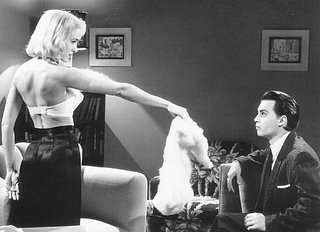 That Richard Wagner sure had star quality! Even now, 124 years after his death, the composer exerts a fascination that extends even to lively speculation about minutiae about his personal life. In a previously unpublished letter unearthed for the premiere issue of The Wagner Journal, Wagner discusses -- well, what do you think? The Grundthemae system? The influence of Greek tragedy on Gluck's "reform" operas? That old standby, The Jews? Actually, none of the above. The Meister burbles on giddily to a Milanese couturiere about a new frock "with a lace jabot and ribbons; close-fitting sleeves; the dress trimmed with puffed flounces - of the same satin material - no basque at the front (the dress must be very wide and have a train) but a rich bustle with a bow at the back, like the one at the front..." and so forth.
That Richard Wagner sure had star quality! Even now, 124 years after his death, the composer exerts a fascination that extends even to lively speculation about minutiae about his personal life. In a previously unpublished letter unearthed for the premiere issue of The Wagner Journal, Wagner discusses -- well, what do you think? The Grundthemae system? The influence of Greek tragedy on Gluck's "reform" operas? That old standby, The Jews? Actually, none of the above. The Meister burbles on giddily to a Milanese couturiere about a new frock "with a lace jabot and ribbons; close-fitting sleeves; the dress trimmed with puffed flounces - of the same satin material - no basque at the front (the dress must be very wide and have a train) but a rich bustle with a bow at the back, like the one at the front..." and so forth.Wait, it gets better. Co-editor Barry Millington, who obviously has quite a bit of free time on his hands, speculates that the 1874 letter "adds weight to the theory that the composer exhibited the tendencies of a cross-dresser". Yes, that's right -- Millington is suggesting that Wagner was ordering the gown for himself, not for Frau Cosima. (The article from the Journal is not available online, but the main points are summarized in The Guardian.) The wealth of girly technical detail in Wagner's letters suggests that even if he didn't intend to swan about in drag, he might have finished in the top three on Project Runway:
... a black satin costume that may be made up in various ways, so that it can be worn out of doors, with or without the cazavoika,* and in the house, even as a negligee, producing a combination of several articles capable of complementing one another* As La Cieca is sure it is utterly superfluous to explain, a "cazavoika" is a type of polonaise, or decorative overskirt drawn up by invisibly placed inner tapes producing a ruched festoon bustle effect.
Well, as delicious as all this speculation may be, La Cieca remains dubious about Wagner's putative transvestism. It appears that the linchpin of the argument here is that the obsessive diarist Cosima never bothered to note the delivery of the basqueless confection her husband ordered; in other words, he appropriated the finery for himself. Meh, says La Cieca; Wagner had lots of frilly things of his own and would hardly have had to resort to subterfuge. ("Oh, it's not for me, of course -- it just happens that my wife wears the same size I do...")
No, La Cieca prefers to think of the Wizard of Bayreuth as the Jeffrey Sebelia of his day, though thankfully without the neck tattoos.
Labels: drag, festoonery, wagner
